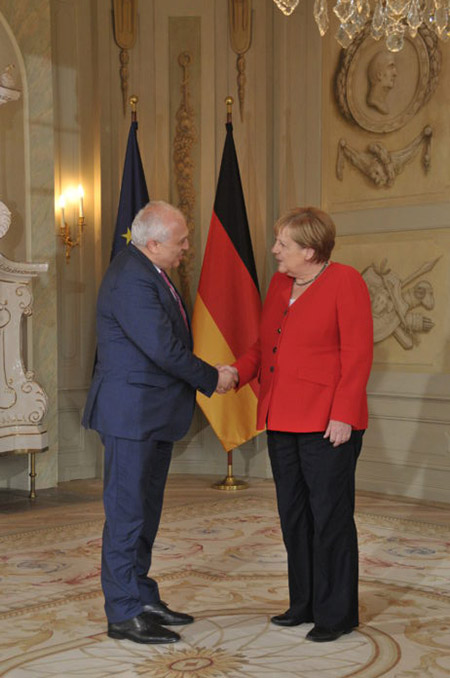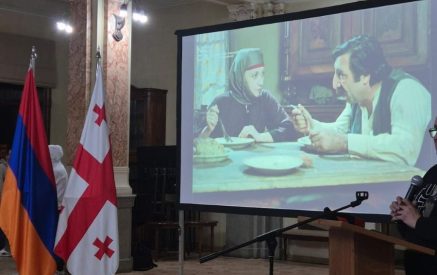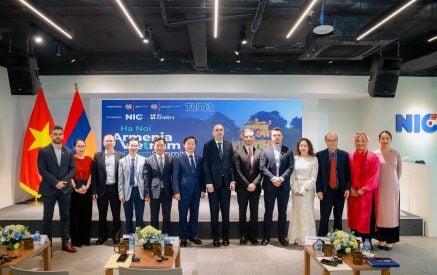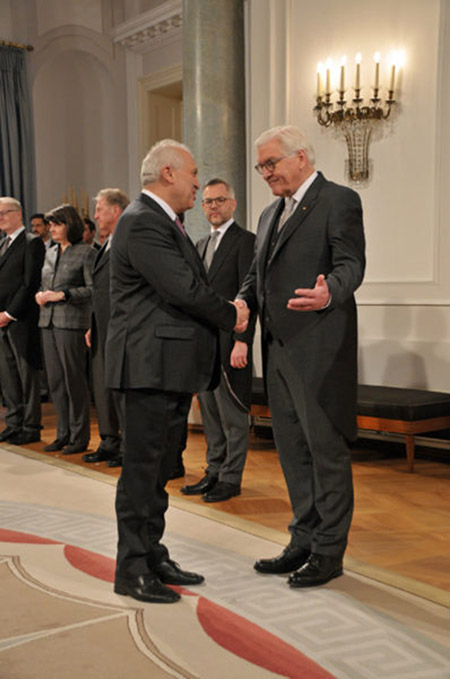by Muriel Mirak-Weissbach
The Armenian Mirror-Spectator
The following exclusive interview was conducted by correspondent Muriel Mirak-Weissbach with Ashot Smbatyan, Ambassador of the Republic of Armenia in Berlin, at the conclusion of his term, on November 26.
Read also
Through your association with Germany for almost 30 years, as a scholar, a teacher and a diplomat both here and in Yerevan, you have witnessed truly historic developments, German reunification and Armenian independence. What would you regard as your biggest achievements on the post of Ambassador and which events made the greatest impact on your life and memories?
Taking a retrospective look at the Armenian-German relations of the last six years, it would not be an exaggeration to describe them as dynamically developing and reflecting the interests of the two countries at both bilateral and multilateral levels.
In terms of both chronology and importance, the year 2016 should unequivocally be singled out. The adoption of the resolution recognizing the Armenian Genocide by the German Bundestag on June 2, 2016 was not only a step forward in the process of the international recognition of the Armenian Genocide, but also reflected Germany’s attitude towards such crimes against humanity. Furthermore, the adoption of the resolution opened a new page in Armenian-German relations, drawing the attention of German society not only to the process of the international recognition of the Armenian Genocide, but also to Armenia itself, as a country with a rich cultural heritage and of possible political, economic and other significance for Europe.
In recent years, there have been numerous bilateral official visits. From the Armenian side, in particular, two official visits by the Presidents, two official visits by the Prime Minister, and one official visit of the Speaker of the National Assembly have taken place in recent years. By the way, the previous visit on the level of the Speaker of the Armenian Parliament to Germany took place more than 20 years ago.
Meanwhile, in 2018 the German Chancellor paid the first-ever official visit to Armenia. Of course, it was a significant event in terms of deepening cooperation in political, economic and other fields. In this context, I would also like to emphasize the opening of the TUMO Center in Berlin, which became a reality thanks to the initiative and dedication of Federal Chancellor Merkel.
The fact that the German Economic Union was established in Armenia during these years and a number of visits of German businessmen to Armenia took place also prove the wide economic representation of Germany in Armenia.
I am glad to note that this year Lufthansa, the largest German airline, resumed flights from Frankfurt am Main to Yerevan.
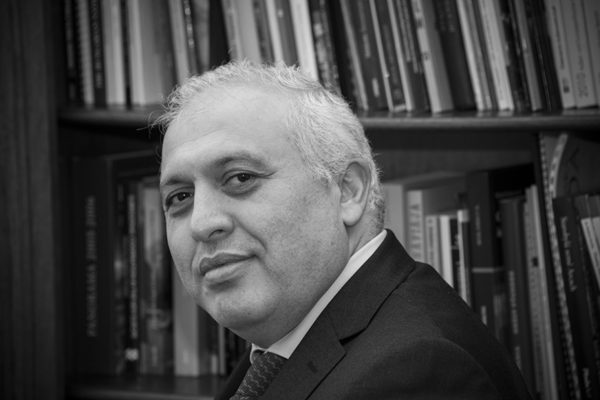
Ashot Smbatyan, Ambassador of the Republic of Armenia in Berlin
As for the relations in the field of education and science, it is gratifying that the German side is also coming up with initiatives of its own. During recent years, the Goethe Center was opened in Yerevan, which is a crucial stage in the establishment of a full-fledged Goethe Institute. I am really hopeful that in the near future the Goethe Institute will be fully operational in Armenia.
Continuing the topic of scientific-educational cooperation, I would like to single out the cooperation agreements between several Armenian and German universities, in particular, between the Yerevan State University (YSU) and Friedrich Schiller University Jena, YSU and Saarland University, YSU and Martin Luther University Halle-Wittenberg, Yerevan State Medical University and Otto von Guericke University Magdeburg, National Polytechnic University of Armenia and Cologne University of Applied Sciences, and so on.
Bright examples of the deepening of decentralized cooperation were the establishment of partnerships between the cities of Yerevan-Leipzig, Gyumri-Halle, as well as Davtashen-Muggensturm, Getap-Zuchau communities.
In Germany, several centers of Armenology continue their activities. For instance, the MESROP Center for Armenology at the Martin Luther University in Halle plays a unique role in this regard. Besides, the Lepsius House in Potsdam has also made a significant contribution to the study of the Armenian Genocide. Not to mention the Institute for Diaspora and Genocide Studies at the Ruhr-Universität Bochum.
In recent years, the number of honorary consuls of the Republic of Armenia in Germany has increased by 5. At present, there are offices of Honorary Consuls of the Republic of Armenia in Baden-Württemberg, Bavaria, Hamburg, Saxony, Saxony-Anhalt, Schleswig-Holstein. It should be noted that the honorary consuls carry out their tasks very effectively, for which I am immensely thankful.
Thus, I can confidently announce that every effort has been exerted to solve the problems we face in favor of deepening cooperation between our two countries.
Do you think there are lessons to be drawn from the German experience for the further development of democracy in Armenia?
It is no secret that Armenia is a young democracy. From this point of view, it has a lot to learn from established European democracies, including Germany. Some aspects of democracy, of course, can be borrowed from the German political system, which, by the way, has already been done to some extent in the form of the introduction of the parliamentary system of government in Armenia, which is very similar to the German model. At the same time, these reforms should also be adapted to the peculiarities of Armenia’s political culture.
As you might know, the electoral systems of Armenia and Germany are more or less similar. Armenia is trying to increase the role of political parties in democratic decision-making at both state and regional levels. Personally, I would like to see the political parties of Armenia resemble the German ones, in particular – to have a rigid ideological basis, when supporters focus on the ideas and the programs proposed by the given party. From this point of view, we have a lot to learn from the German experience.
Three years ago at the Lepsius House in Potsdam, you spoke about Armenia’s efforts to strike a balance in foreign relations, considering what you called its ”geographical interface between Europe and Asia.” Armenia had been developing closer ties with Europe and the European Union and at the same time maintaining good relations with countries of the former Soviet Union, through the Eurasian Economic Union. How do you evaluate the current situation?
Indeed, the geographical location of Armenia and the overall region is such that it can act as a bridge between Europe and Asia. This approach has been one of the underlying pillars of Armenia’s foreign policy for many years. In this context, on the one hand, Russia remains a strategic ally of Armenia. At the same time, Armenia is also a member of the Collective Security Treaty Organization (CSTO), the Eurasian Economic Union (EEU), and attaches high importance to cooperation in these formats.
On the other hand, Armenia maintains close partnership with the European Union (EU), as well as with its member states on a bilateral level. Since the independence of Armenia, the EU has made a great contribution to the implementation of reforms in a number of spheres in Armenia, providing great support to the democratization processes. As you know, since 2009 the EU has launched the Eastern Partnership (EaP) framework, which, along with 5 other countries, includes Armenia. As a result of the deepening ties within the EaP, in 2017 the Comprehensive and Enhanced Partnership Agreement (CEPA) was signed between Armenia and the EU, which opened a new stage in Armenia-EU relations and outlined the prospects of cooperation for the coming years. We can even call it the “constitution” of today’s Armenia-EU relations. Due to the ongoing democratization process in Armenia, there is solid ground to expect a further increase in EU financial and other assistance.
Summing up the topic and attaching high importance to the cooperation with the EU, I would also like to mention that Armenian society, which has chosen the path of democracy, was expecting more from the EU during last year’s 44-day war. I am hopeful that this will be taken into consideration and properly analyzed by our European colleagues.
The 44-day war in Artsakh last year has led to a dramatic deterioration in the region and fear of renewed aggression by Azerbaijan. How do you think the Minsk Group of the OSCE (Organization for Security and Co-operation in Europe) could make progress towards a just diplomatic solution? What role could Germany play?
The OSCE Minsk Group co-chairmanship remains the only internationally recognized format aimed at the peaceful settlement of the Nagorno-Karabakh conflict. It should be noted that the essence and the underlying problem of the Nagorno-Karabakh conflict – the issue of the status of Nagorno-Karabakh – has not been resolved yet. This can only be achieved through the expression of the will by the people of Nagorno-Karabakh. Today, the destructive stance of Azerbaijan greatly hinders the work of the OSCE MG. On the one hand, Azerbaijan, while in front of the international community hypocritically rooting for peaceful coexistence and peace in the region, refuses to return Armenian prisoners, disregarding the respective provision of the November 9 trilateral declaration, which clearly states that both sides are obliged to return all prisoners and which the Armenian side has fully implemented. Moreover, since May 2021, Azerbaijan has been carrying out aggression against the sovereign territory of the Republic of Armenia, with another episode of the latter taking place literally several days ago. Talking about peaceful coexistence of the two peoples, while targeting and killing civilians carrying out agricultural, construction and other work, which has happened quite recently, are simply incompatible.
Thus, it is too early to talk about stable peace or effective negotiations until Azerbaijan stops its reckless and irresponsible behavior. The desire and the outstretched hand of one side alone is never enough for establishing lasting peace.
As for the position of the German government, Armenia has always appreciated the balanced stance of Germany. As a member of the OSCE Minsk Group, Germany has always supported the peace negotiations under the auspices of the OSCE MG Co-Chairs. Germany has always paid close attention to the ongoing processes over the Nagorno-Karabakh conflict and tried to promote the peaceful settlement of the conflict.
In addition, it should be noted that today the EU can provide targeted humanitarian assistance to the Armenian population of Artsakh, thus contributing to the stabilization of the situation in the region. In this regard, why not, we should also expect active steps from Berlin.
Armenia, like Germany, has a rich cultural heritage, in literature, art and architecture, and especially music. Fruitful collaboration has developed among cultural institutions of the two countries, including the Matenadaran and the Frauenhofer Institute, the German Academic Exchange Service (DAAD), as well as concert tours by the Little Singers of Armenia and the Ars Musica men’s chorus, not to mention the Armenian Cultural Days held in several German cities, and the twin city partnerships. How do you think this cooperation can be further nurtured?
As you rightly mentioned, the cooperation between Armenia and Germany in the fields of culture and art has been quite effective so far. The main idea here is not only to preserve those well-established relations, but also to search for new common points, which, in the end, can pave the way for new spheres of cooperation. For example, last year, with the support of the German government and the International Search and Rescue (ISAR) organization, 16 leading German health professionals traveled to Armenia to assist Armenian specialists in the fight against Covid-19. This is a rather vivid example of cooperation in a “new field”.
In my opinion, the proper presentation of our centuries-old and rich culture should have a strategic place in our foreign policy, because both in terms of cultural presentability and the performance skills of our talented cultural figures, it is totally possible to present and expand Armenia’s cultural wealth abroad, while also making Armenia attractive for foreigners.
Historians and genocide scholars have appreciated the way Germany has dealt with its past, working through the history of the Shoah and building a culture of remembrance. Over recent years, there have been initiatives to honor the victims of the Ottoman genocide, like the Altars of Remembrance at the Evangelical Luisenkirchof in Berlin-Charlottenburg, Khachkars in Berlin and elsewhere, as well as the annual April 24 commemorations. Yet, classroom instruction about the Armenian genocide is still very rare in schools and universities, despite the fact that the 2016 resolution passed by the Bundestag called for such programs to be introduced. Do you have any thoughts about this?
Indeed, the adoption of the resolution on the recognition of the Armenian Genocide by the German Bundestag on June 2, 2016 was a key event through which the German legislative body properly assessed the crimes committed by Ottoman Turkey against Armenians in the early 20th century. This resolution, together with the statements by the President of the Federal Republic of Germany Joachim Gauck and the President of the Bundestag Prof. Dr. Norbert Lammert, made on the occasion of the 100th anniversary of the Armenian Genocide, are a valuable contribution of Germany not only to the process of international recognition and condemnation of the Armenian Genocide, but also in the context of the universal struggle against genocides and the prevention of such crimes against humanity.
I think that Germany, as a country which has courageously embraced its history and which serves as a clear bearer of the politics of memory, can also contribute to incorporating the memory of the victims of the Armenian Genocide into the overall “European memory.” In this regard, your question was very relevant, because it is through education, especially during school years, that we should talk about such crimes. That is how one should prevent them.
You mentioned Khachkars or monuments in different German cities, yes, they not only symbolize and perpetuate the memory of the victims, but also have educational significance, because everyone who visits these places understands the essence of the issue.
This provision has always been in the center of our attention. I think that both the Embassy and the Armenian community have a lot to do here, as it is officially only in 4 states, where the topic of the Armenian Genocide is included in the educational programs. But Germany has 16 states, so there is a lot of work to be done.
It should be noted that the German Conference of Ministers of Culture, which coordinates school education in Germany, has also submitted a proposal to the states, whereby each of them has to discuss and make a decision on the issue. Of course, the Armenian community also has some work to bring the issue to the attention of Landtags (State Parliaments) in these states.
With the recognition of the Namibian Genocide, the German government once again showed its special attitude towards the politics of memory. It should not be forgotten that back in 2016 Mr. Wirtz, the then spokesman of the Chancellor, had told the German media the day before the resolution on the Armenian Genocide was adopted, that the Chancellor supported the Resolution.
There are several German intellectuals of Turkish descent here who have dealt with the genocide in art, filmmaker Fatih Akin, for example, and the recently deceased novelist and playwright Doğan Akhanlı. How do you evaluate the role of such artistic endeavors in the process of education, dialogue and remembrance?
Indeed, the topic of the Armenian Genocide, as one of the most catastrophic events of the 20th century, has not been overlooked by various artists of the world, including those of Turkish origin, which is definitely commendable. In this context, I would also like to mention the Nobel Prize winner Orhan Pamuk.
I personally attended the premiere of film director Fatih Akin’s “The Cut,” I also knew Doğan Akhanlı in person, who, unfortunately, passed away prematurely. One of their most important missions is that they bravely and honestly tried to communicate with Turkish society in their mother tongue, Turkish, and to present the realities. Unfortunately, looking back, we can say that years ago the Turkish intelligentsia was much more courageous in this regard than lately, given the decline of democracy in Turkey in recent years. Therefore, such people should always be encouraged and supported.
Thank you, Your Excellency. Our best wishes to you and the people of the Republic of Armenia.



















































